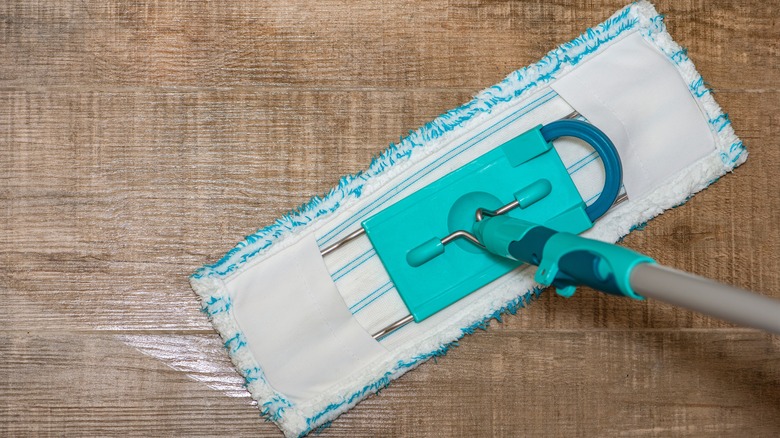We’ve all been there: staring down a grimy tile floor, desperately searching for the quickest and easiest way to restore its shine. Windex, the go-to solution for sparkling windows, seems like a tempting option, but can it really handle the demands of tile floors?

Image: www.housedigest.com
The answer, unfortunately, is not a simple yes or no. While Windex can technically be used on tile floors, it’s not always the ideal choice. To understand why, we need to delve into the complexities of tile cleaning and the specific ingredients in Windex.
The Allure of Windex: A Multifaceted Cleaner
Windex is a household staple for good reason. Its formula, primarily based on ammonia and isopropyl alcohol, effectively cuts through grease, grime, and fingerprints. This versatility makes it a favorite for various surfaces, including windows, mirrors, and countertops.
But the same qualities that make Windex so effective can also pose challenges for tile floors. Specifically, the ammonia in Windex can be harsh on certain types of grout, potentially causing discoloration or damage over time. Additionally, the alcohol content can strip away the protective sealant on some tiles, leaving them vulnerable to stains and scratches.
Tiles: A Diverse Landscape of Cleaning Needs
Tile floors come in a wide variety of materials, each with its own cleaning requirements. Some common types include:
- Ceramic Tile: Generally durable and resistant to most cleaning products, including Windex.
- Porcelain Tile: Similar to ceramic tile in terms of cleaning, but often features a denser surface.
- Natural Stone Tile: Includes materials like marble, granite, and travertine, which are typically more sensitive to harsh chemicals.
- Vinyl Tile: More susceptible to scratches and abrasions, and therefore requires gentler cleaning methods.
Windex: A Risky Venture for Some Tiles
While Windex may work on ceramic and porcelain tiles, it’s best to err on the side of caution with natural stone and vinyl tiles.

Image: diymelon.com
Natural Stone Tile
Natural stone tiles are porous and prone to etching, a phenomenon where chemicals etch away the surface and leave permanent marks. The ammonia in Windex, even in diluted form, can contribute to etching on natural stone tiles. Additionally, some stone sealants can be compromised by alcohol, making the tiles more vulnerable to stains and damage.
Vinyl Tile
Vinyl tile is generally more sensitive to harsh chemicals than ceramic or porcelain. The alcohol in Windex can dry out and dull the vinyl, leading to a less polished appearance over time. This can also make the tile more susceptible to scratches and wear and tear.
Safe Alternatives for a Sparkling Tile Floor
Fortunately, there are many safe and effective alternatives to Windex for cleaning tile floors.
General-Purpose Tile Cleaners
These cleaners are specifically designed for tile surfaces and often contain milder ingredients that won’t harm the grout or the tile itself. Look for cleaners with pH-balanced formulas that are safe for all types of tile. Many brands also offer specialized cleaners for natural stone, which are formulated to remove grime without etching the surface.
Homemade Cleaning Solutions
If you prefer natural cleaning options, a simple solution of warm water and dish soap can be very effective for most tile floors. For dirtier floors, you can add a tablespoon or two of baking soda to the mixture. For natural stone, you can combine a cup of warm water with a tablespoon of white vinegar for a gentle but effective cleaning solution.
Important Tips for Cleaning Tile Floors
Regardless of the cleaning solution you choose, follow these general tips for a sparkling and well-maintained tile floor:
- Sweep or vacuum the floor regularly: This removes loose dirt and debris, reducing the buildup of grime that can make cleaning more difficult.
- Clean spills promptly: This prevents stains from setting in and becoming more difficult to remove.
- Rinse thoroughly: Ensure that all traces of the cleaning solution are removed to prevent streaking or residue buildup.
- Dry the floor completely: Wipe down the tiles with a soft cloth or allow the floor to air dry. This prevents water spots and ensures a shiny finish.
- Consider a sealant: A sealant can help protect natural stone tile from stains and scratches. Speak to a flooring specialist for advice on appropriate sealants for your specific tile type.
Can You Use Windex On Tile Floors
Conclusion: Choosing the Right Cleaner for Your Tile
While Windex can be tempting for its quick cleaning action, its potential for damage on certain tile types makes it a risky choice. Opting for a specialized tile cleaner, a homemade solution, or even just warm water and dish soap can provide a safer and more lasting solution for a sparkling tile floor. Remember, the key to long-lasting shine is to use the right cleaner for the right tile.





